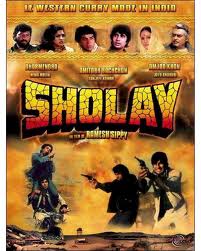|
Modern Indian Cinema
 The 1970s did, nevertheless, see the rise of commercial cinema in form of enduring films such as Sholay (1975), which solidified Amitabh Bachchan's position as a lead actor. The devotional classic Jai Santoshi Ma was also released in 1975. Another important film from 1975 was Deewar, directed by Yash C Commercial Hindi cinema further grew throughout the 1980s and the 1990s with the release of films such as Ek Duuje Ke Liye (1981)Mr India (1987), Qayamat Se Qayamat Tak (1988), Tezaab (1988), Chandni (1989), Maine Pyar Kiya (1989), Baazigar (1993), Darr(1993) Dilwale Dulhaniya Le Jayenge (1995) and Kuch Kuch Hota Hai (1998), many of which starred Sridevi, Shahrukh Khan, Aamir Khan and Salman Khan. The 1970s did, nevertheless, see the rise of commercial cinema in form of enduring films such as Sholay (1975), which solidified Amitabh Bachchan's position as a lead actor. The devotional classic Jai Santoshi Ma was also released in 1975. Another important film from 1975 was Deewar, directed by Yash C Commercial Hindi cinema further grew throughout the 1980s and the 1990s with the release of films such as Ek Duuje Ke Liye (1981)Mr India (1987), Qayamat Se Qayamat Tak (1988), Tezaab (1988), Chandni (1989), Maine Pyar Kiya (1989), Baazigar (1993), Darr(1993) Dilwale Dulhaniya Le Jayenge (1995) and Kuch Kuch Hota Hai (1998), many of which starred Sridevi, Shahrukh Khan, Aamir Khan and Salman Khan.
In the late 1990s, 'Parallel Cinema' began experiencing a resurgence in Hindi cinema, largely due to the critical and commercial success of Satya (1998), a low-budget film based on the Mumbai underworld, directed by Ram Gopal Varma and written by Anurag Kashyap.
Indian cinema's early contacts with other regions became visible with its films making early inroads into the Soviet Union, Middle East, Southeast Asia, and China. Mainstream Hindi film stars like Raj Kapoor gained international fame across Asia and Eastern Europe. Indian films also appeared in international fora and film festivals. This allowed 'Parallel' Bengali filmmakers such as Satyajit Ray to achieve worldwide fame, with his films gaining success among European, American and Asian audiences
Since the 1980s, some previously overlooked Indian filmmakers such as Ritwik Ghatak and Guru Dutt have posthumously gained international acclaim.
Indian Cinema was also recognised at the American Academy Awards. Three Indian films, Mother India (1957), Salaam Bombay!(1988), and Lagaan (2001), were nominated for the Academy Award for Best Foreign Language Film. Indian winners of the Academy Awards include Bhanu Athaiya (costume designer), Satyajit Ray (filmmaker), A. R. Rahman (music composer), Resul Pookutty (sound editor) and Gulzar (lyricist).
|

